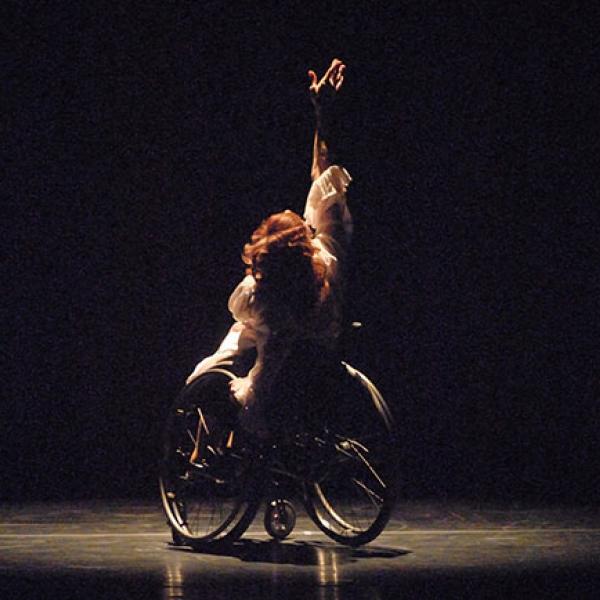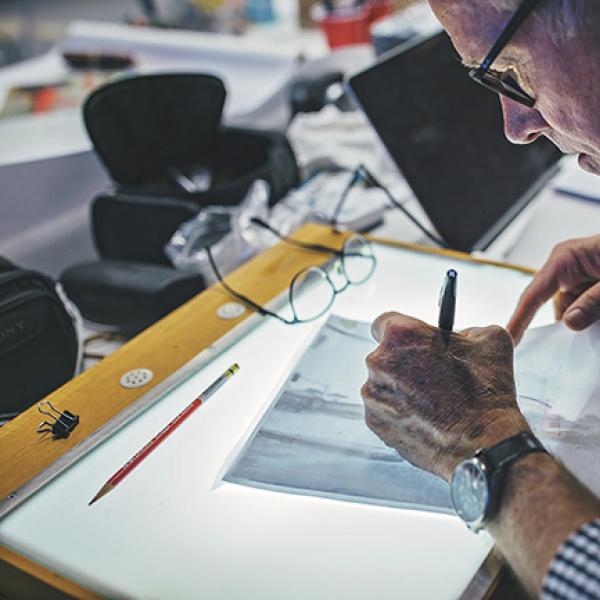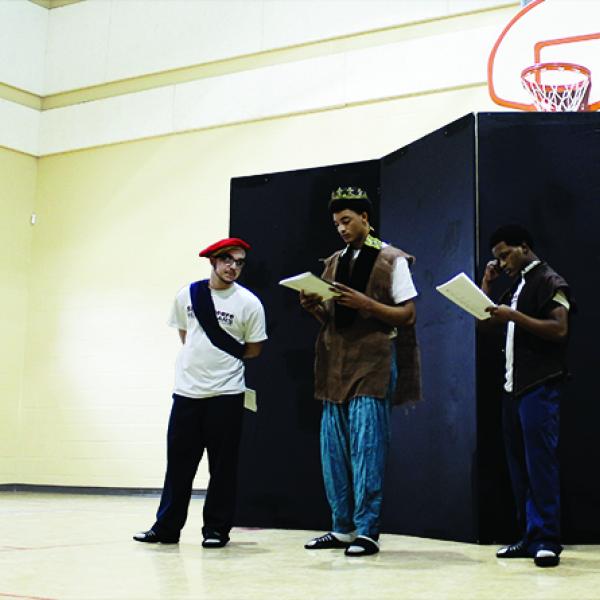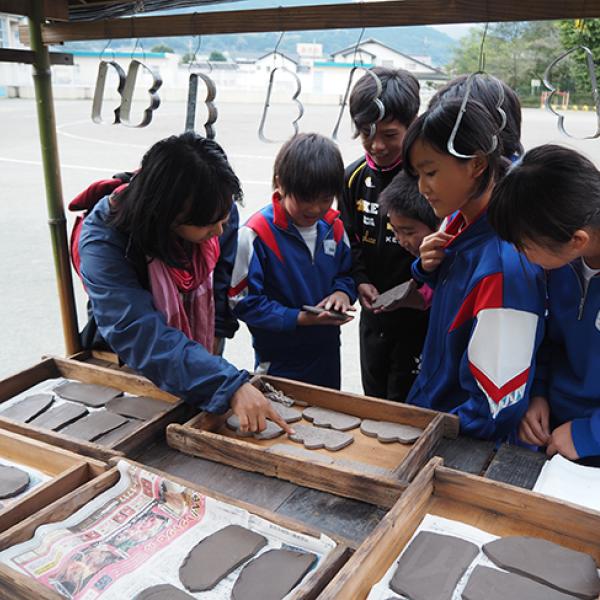Hidden in Plain Sight
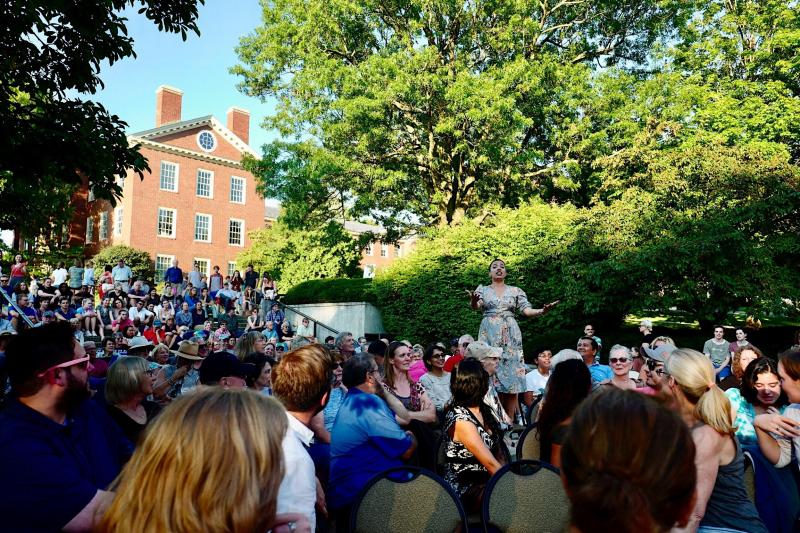
The National Endowment for the Arts Regional Touring Program has tremendous impact throughout the country. But chances are, if you’re not a regional arts organization or a presenting organization in a rural or underserved community, you have never heard of it. Well, sit back, have a listen, and acquaint yourself with a national program that works with regional organizations to help artists reach new audiences, provides funding for presenters eager to introduce a diverse array of performers to their communities, and enables underserved community residents to connect with live performing arts. We’ll hear about the work and impact of the NEA Regional Touring Program in the Mid Atlantic region with Executive Director of the Mid Atlantic Arts Foundation Theresa Colvin, Artistic Director of Carnegie Hall in West Virginia Lynn Creamer, and singer/songwriter Crys Matthews, who has performed eight shows as part of the touring arts program.
Josephine Reed: Under the banner of the NEA Regional Touring Program, Mid Atlantic has developed and supports a range of artistic programming. Theresa Colvin.
Theresa Colvin: Our two anchor programs are the Mid Atlantic tours, where our curatorial staff selects a roster of artists. After doing much, much research and attending multiple conferences, performing arts conferences and meeting with artists, seeing excerpts of their work, we are aware as we can possibly be of all the offerings that are available out there. We put together a list of potential artists that presenters might be interested in. It’s a dual process very much involving the presenters that know much more about their audiences and are closer to their communities, what they would be interested in. Then a final roster of six to seven artists are selected to be on a tour for a year, and then the presenters are able to receive subsidies or artist fee support to bring those artists or ensembles into their communities. That’s one program.
Theresa Colvin: Our ArtsCONNECT program, that’s another one of our Regional Touring programs. This actually involves multiple presenters coming together in a coalition as a consortium to work with one artist ensemble, bringing them into their community and basically having an extended residency of sorts. So connecting again community members with the artist, and then in addition to a performance, also have community engagement activities. It may involve workshops, lectures, demonstrations, a symposia around a particular community issue. So oftentimes using the arts to address other specific community challenges that presenters would like to also address in their work.
Josephine Reed: As I mentioned—each regional arts organization responds to its regions artistic heritage when selecting programming. Theresa Colvin
Theresa Colvin: Because the Mid Atlantic region has such a rich history and legacy of jazz, when you think about Philadelphia, D.C., Baltimore, New York, it’s very hard to not realize that there is a significant tradition here of jazz. So the Mid Atlantic Arts Foundation put together a program to specifically support jazz artists and the movement of jazz across the region, and over the course of the last-- I’d say the last 12 to 15 years, the Jazz Touring Network has been formed and supported by Mid Atlantic, with the assistance of funding, of course, from the National Endowment for the Arts through the Regional Touring Program. We now have two dozen members. This is a network of jazz presenters. They are committed to presenting jazz on an annual basis as part of their ongoing program. The network themselves makes the recommendations. One of the requirements to be in the network is that you provide recommendations for artists, for jazz artists.
Josephine Reed: Lynn Creamer is the artistic director of Carnegie Hall in West Virginia. She finds the regional touring company indispensable to creating first-rate programming.
Lynn Creamer: Our mission is to present diverse programming to our geographically isolated region. We serve a five-county region here in southwest West Virginia. We also strive to provide low-cost ticket prices as well as educational opportunities for the citizens of the area.
We have been presenting regional touring programs since 2004.
It has allowed us to provide professional touring artists and ensembles to our region. Through fee support, through professional development, we're able to present artists that we wouldn't be able to afford while keeping our ticket prices low and providing performance and community engagement activities at the same time.
Josephine Reed: Carnegie Hall in West Virginia is a perfect client for the NEA Regional Touring Program which strongly emphasizes deep outreach to communities that may not have access or only limited access to live performing arts programming. Theresa Colvin
Theresa Colvin: It’s very much part of our DNA, part of our origin story, if you will, from the Arts Endowment, which is that a significant portion of our funding does go to underserved and rural audiences.
Lynn Creamer: Honestly, we’re in awe that we are able to bring these performers to our region. Oftentimes, we hear, “Where did you find these people? How did you come up with these amazing artists?” And a big part of it is by participating with regional presenting organizations.
Josephine Reed: Crys Matthews is a singer/songwriter—who we heard at the top of the show. She’s one of the artists who performed with the regional touring program….and it’s been an eye-opening experience for her.
Crys Matthews: I've gotten to go to a couple of regions that I don't get to play very often, because with the partnership with Mid-Atlantic Arts, some of the presenters who aren't necessarily able to have it in the budget to bring an artist that's not from closer to home in, are able to do so. And it's just been great.
Josephine Reed: Theresa Colvin sees the Regional Touring Program benefitting artists as well as communities
Theresa Colvin: Not only does it allow audiences to see their work and to be moved by it, but it also allows those artists, of course, a livelihood. It helps support their own development, professional development, whether that be on the artistic side or on the administrative side. They really become, I would say, better artists, by engaging with more diverse audiences. It certainly expands their work and expands audiences’ understanding and knowledge about that art form or about that artist.
Josephine Reed: So as audiences experience diverse artistic programs, Lynn Creamer points out the artists can find themselves learning deeply about rural America.
Lynn Creamer: it's a two-way street when artists from urban areas come. A lot of people in urban areas go into the country surrounding their area, but to come deep in the hollows and hills of our state can be eye-opening for many of them and inspiring.
Josephine Reed: Theresa Colvin sees a reciprocal relationship between audience and artists—with each learning from the other.
Theresa Colvin: For Mid Atlantic and other regionals, we feel it’s very important that we connect those artists and ensembles in the performing arts, music, theater, dance, and that we provide meaningful arts experiences for the audiences as well. So connecting those two entities we really feel unlocks the transformative power of the arts, if you will, and is meaningful both for the artists as well as for the communities in which they’re performing.
Josephine Reed: For Crys Matthews, performing through the regional touring program has been an enriching experience.
Crys Matthews: The communities are so different. For example, in West Virginia the community that I was playing to was so diverse in age and background, it was really almost like getting to play for a small swath of America. It was very, very cool. So many ages and just so many different configurations of families. But all there together to experience the music and to enjoy it together. I think that's one of the beautiful things about music is that oftentimes when we're not able to find commonalities any other place, we're so very easily able to find them in music and in the way that certain things speak to us collectively, it's really beautiful to watch. So it's been a really gentle reminder to not be presumptuous about who is in those different places to give them a chance. Just like they'll give me and my music a chance, because more often than not, I'm very pleasantly surprised, and I tend to find they are, too.
Josephine Reed: Theresa Colvin believes participating in the program grows the artists in many ways.
Theresa Colvin: The impact of the Regional Touring Program, I think you can certainly look to the artists themselves and the growth opportunity that it has provided them through touring and getting to practice their work, their art form, and what they get from engaging with audiences from different communities, the response to it, and oftentimes, of course, they get feedback, direct feedback, and that can’t help but inform their work, broaden their view, Josephine Reed: Crys Matthews actually wrote a couple of songs influenced by her participation in the Regional Touring Program. Crys Matthews: Actually my most recent two songs-- are just about meeting people where they are, and about just kind of opening yourself up to life and to the experience of life. It's been lovely just getting glimpses of that humanity, you know, that beautiful, beautiful humanity. Josephine Reed: There can be a kind of magic that happens when people come together around art: for the performer, for the audience, and for the greater community Mid Atlantic Arts Foundation director Theresa Colvin Theresa Colvin: For community life, I think that when you think of how important it is that people gather together and meet in one place at one time to experience something collectively, I believe that that really makes us a stronger community. It makes us a stronger neighborhood, and, you know, multiple that out, expand that out to a state, a region, a country, it’s very moving. It can be illuminating. It can teach you about yourself. It teaches you about others that are-- that you’re not familiar with, a point of view that you weren’t familiar with before. It just connects you to something larger than yourself. Josephine Reed: Artistic director of Carnegie Hall in West Virginia Lynn Creamer.Lynn Creamer: For rural communities to have artists from other areas come to our community, it brings the world to the citizens of our very geographically isolated county. Not only are we geographically isolated, we have lack of infrastructure in terms of communication. The internet is not accessible for many, many people in this region, so bringing the world to people here is a huge opportunity that we're honored to be able to do. We are eternally grateful for the opportunities provided to us through the Mid Atlantic Arts Foundation and the National Endowment for the Arts. We just wouldn’t be able to do what we do with the caliber of artists that we are able to present without their support.
Josephine Reed: Singer and Songwriter Crys Matthews.Crys Matthews: Participating in the Mid-Atlantic Touring Artist Program has been absolutely incredible! It's really been wonderful to get to share my music and myself with so many different communities and in places that I don't often go. It's been really, really lovely to get a chance to share my work with those different communities and have it be received with them with such open hearts and arms.
Josephine Reed: A thank you to Theresa Colvin, Lynn Creamer, and Crys Matthews. Special thanks to Crys for use of her wonderful music. Find out what the Mid Atlantic Arts Foundation is offering through the NEA regional Touring Program go to midatlanticarts.org. For the National Endowment for the Arts, I’m Josephine Reed. Thanks for listening. Music Credits: “By My Side,” and “Exactly Where You Are” written and performed by Crys Matthews. Recorded live at the National Endowment for Arts. “Renewal” written and performed by Doug and Judy Smith. Used courtesy of the Free Music Archive. ”Nicotine Blues” written and performed by Kurt Vile. Recorded live at WFMU and used courtesy of the Free Music Archive. “Brother Mister” from the cd Kind of Brown composed by Christian McBride, performed by Christian McBride and Inside Straight. Used courtesy of Mack Avenue.

